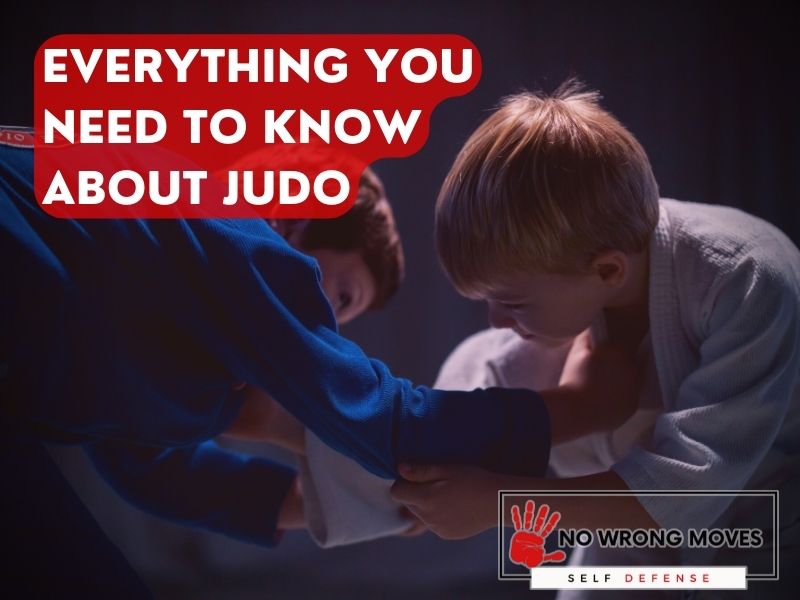
So you want to know more about Judo? Eager to learn about it before you actually hop into it? Trust me, you've made the right call. There are lots of things this wonderful martial art can offer you, and you'd be wise to try and pick these benefits up for yourself.
Or maybe not! Maybe you just have a passing interest in the martial art. Maybe you're just curious to figure out more about it. If you are, then that's cool too! And I'd be glad to help you out here.
In this post, I'll tell you everything you need to know about Judo, focusing on the following;
- What Judo is;
- Where Judo comes from;
- The benefits of Judo;
- How to get started in this martial art;
- What to expect for your first Judo class;
- Judo's different ranks and levels;
- The importance of a good Judo instructor;
- Using Judo for self-defense.
And by the end of all this, you'll have everything you need to sate your Judo curiosity. Let's get straight into it!
What is This Martial Art? Everything You Need To Know About Judo
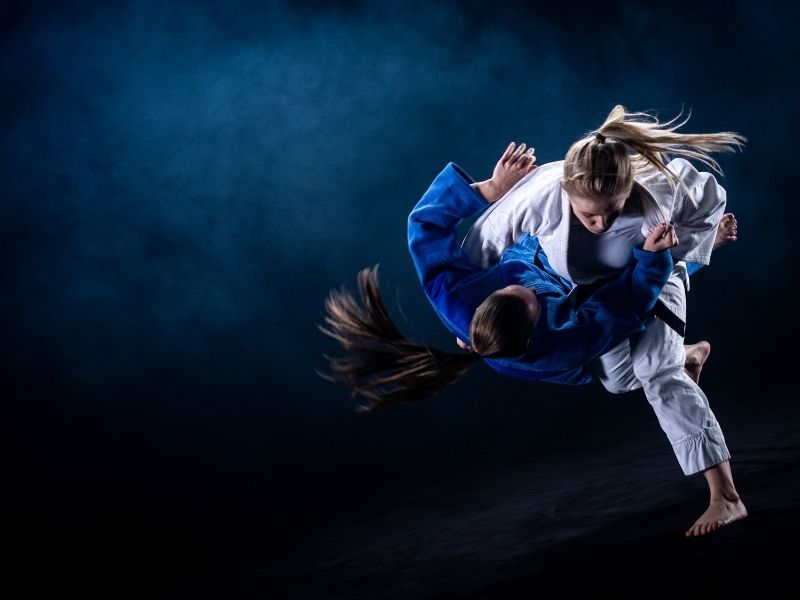
Judo is a martial art that originated in Japan in the late 19th century. It was founded by Jigoro Kano, who sought to create a system of self-defense that focused on using an opponent's strength against them.
Judo translates to "the way of gentleness," and its philosophy emphasizes the importance of mutual welfare and benefit.
At a fundamental level, Judo is a grappling-based martial art that involves throwing, joint-locking, and submission techniques. As a practitioner, your aim will be to use an opponent's momentum and force against them, rather than relying on brute strength or aggression.
Judo techniques are designed to be efficient and effective, allowing even smaller individuals to successfully defend themselves against larger opponents.
Judo training typically involves a combination of physical conditioning, technique practice, and sparring. Practitioners wear a gi, a traditional uniform consisting of a jacket and pants, and may also use various training aids such as mats and resistance bands.
That level of technical proficiency doesn't come easy, as you can imagine. Judo techniques require precise timing, balance, and coordination, making it a challenging--but also deeply rewarding--martial art to practice.
Beyond its physical benefits, Judo also offers a range of mental and emotional benefits. Judo practice can really do wonders for your self-discipline, focus, and self-confidence, and it can help you develop problem-solving and decision-making skills.
It really is a holistic martial art, one that emphasizes personal growth and development, on top of giving you the ability to defend yourself in a variety of situations.
Where Does Judo Come From? What’s The Story?
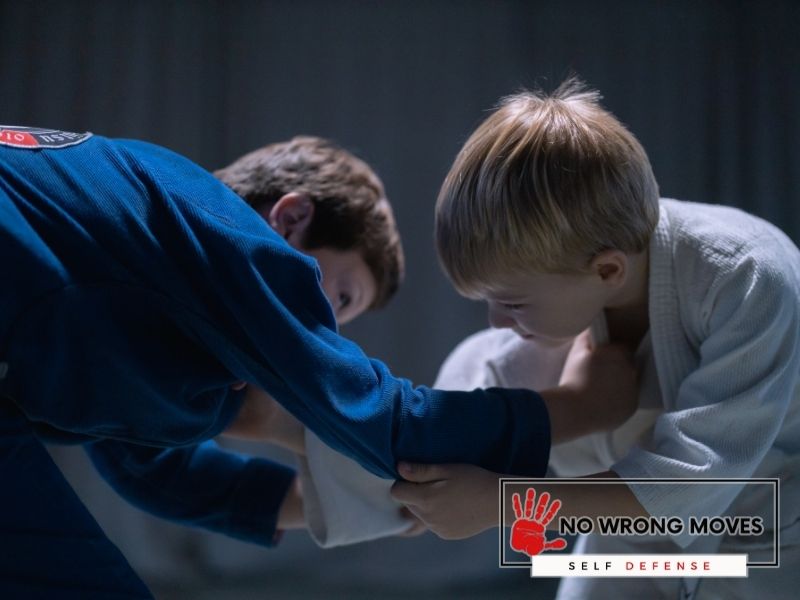
If we want to discuss the history of Judo, we'll first have to begin with Jiu-Jitsu, Japan and the Samurai warrior!
As the samurai class lost its importance and power in Japan in the 1800s, so too did the martial art of jiu-jitsu, which had been practiced almost exclusively by them.
In 1868, Japan began a period of modernization known as the Meiji era, and with it came a need for a more modern military.
This led to a decline in the use of jiu-jitsu as a form of self-defense and combat, and it began to be associated with thugs and brawlers.
But one man saw potential in jiu-jitsu and decided to revive it. That man was Jigoro Kano, who is considered the founder of Judo. Kano was born in 1860 into a family of samurai who had lost their status and power several generations earlier.
Despite this, Kano was highly educated and became intrigued by jiu-jitsu while studying at Tokyo University. After becoming proficient in the art himself, Kano opened his own jiu-jitsu school in 1882.
There he developed a new form of jiu-jitsu that relied less on brute strength and more on technique and discipline. He called this new form Judo, which means "the way of gentleness."
Kano's new approach proved to be particularly successful, and Judo soon spread throughout Japan. In 1936, it was even recognized as an official sport by the International Olympic Committee.
Since then, Judo has continued to grow in popularity all over the world. It is now practiced by millions of people in over 200 countries, and it's considered one of the most effective forms of self-defense out there.
Benefits of Judo
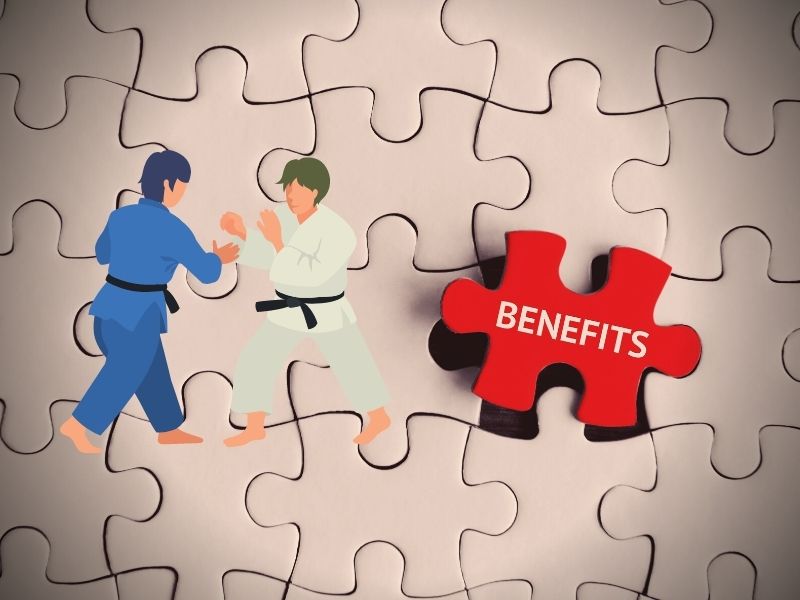
Judo is a martial art that offers a multitude of benefits to its practitioners. One of the most significant advantages of practicing Judo is the improvement of balance, coordination, and flexibility. As a result, you can develop a better sense of control over your body and movements.
In addition to physical improvements, this martial art can also have a positive impact on your mental health. The sport requires focus, discipline, and concentration, all of which can help to enhance your ability to stay happy, present, and engaged in various aspects of life.
Another benefit involved here is the development of your self-confidence and self-esteem. Judo practice provides its students with a sense of achievement and progress as they learn new techniques and skills.
This newfound confidence can be applied to various other aspects of life, such as work, relationships, and personal goals.
Furthermore, Judo can also improve your physical fitness and strength. The sport provides a full-body workout that can develop strength, endurance, flexibility, and coordination.
Regular practice can also help you lose weight and improve your overall physical condition, including the development of cardiovascular and respiratory capabilities.
Apart from these benefits, Judo can also help to reduce stress and anxiety. The physical exertion and mental focus required during training can act as a form of therapy, allowing practitioners to release tension and clear their minds.
Next up, this discipline can also improve reflexes and reaction time, which can be useful in various situations. Finally, the lifestyle that accompanies the practice of Judo, such as stretching and healthy eating, can contribute to an overall sense of wellbeing.
So in general, Judo provides a range of benefits that extend beyond physical fitness and self-defense. The sport can have a positive impact on mental health, confidence, and overall well-being.
How to get started in Judo
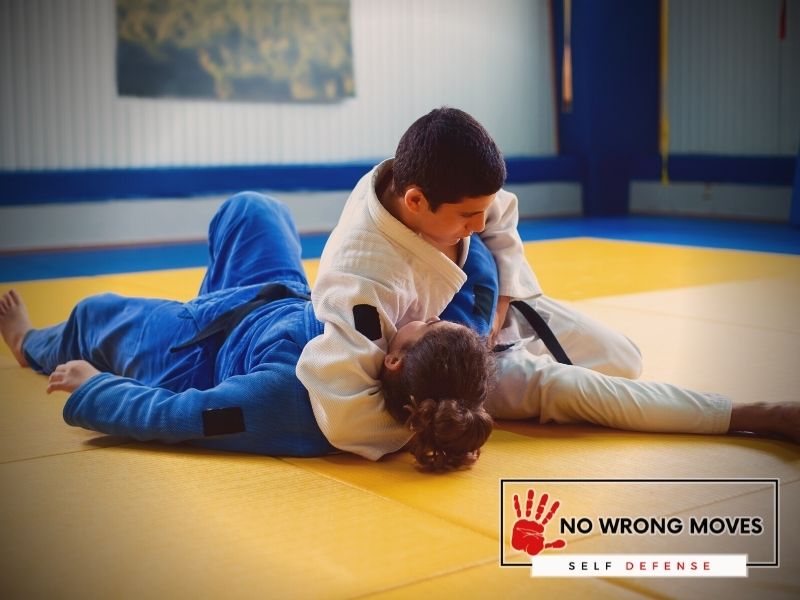
Starting your journey in Judo can be both exciting and overwhelming. However, with the right mindset and approach, you can make the most out of your training experience.
To begin, it's essential to research various Judo schools and find one that resonates with your personal goals and beliefs.
Once you've identified a potential school, attend a trial class to get a feel for the atmosphere and instructors. This will give you an opportunity to gauge if the school is a good fit for you.
Next, focus on learning the basic techniques, principles, and forms of Judo under the guidance of a qualified instructor. You'll absolutely need consistent practice in order to develop your technique and understanding of Judo's many principles.
In addition to regular practice, challenging yourself through attending workshops and seminars, sparring with other practitioners, and seeking new opportunities for growth within the Judo community will accelerate your progress.
Watching and studying Judo masters, both online and in competitions, can also be a great source of inspiration and new insight into the art.
Remember to approach your practice with humility and an openness to learning. That's a big part of what makes Judo... well, Judo, after all--a journey of continuous improvement and self-discovery.
What To Expect In Your First Judo Class
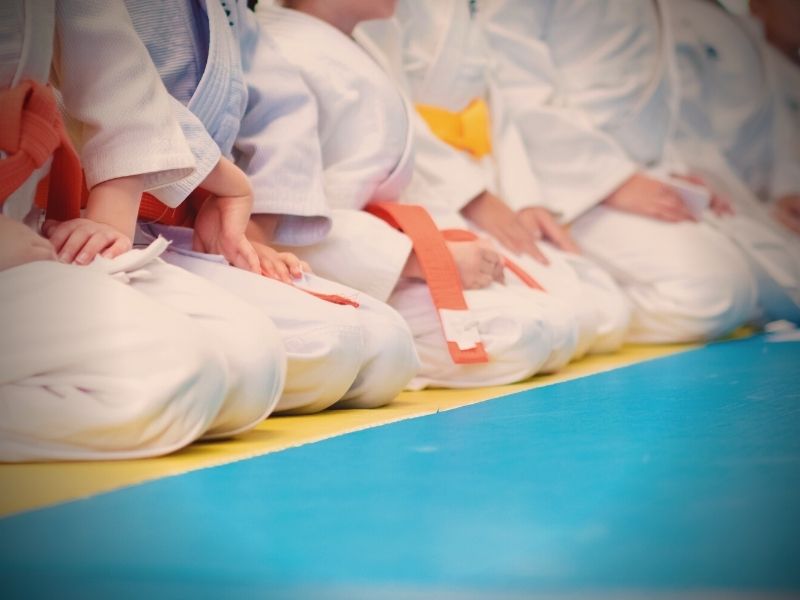
In your first Judo class, you can expect to be welcomed into a supportive and encouraging environment.
Judo is an exciting and dynamic martial art that will seriously challenge you physically and mentally, but it will also reward you for every ounce of effort you put into it.
Your first class will almost certainly start with a warm-up, done to get your body ready for the exercises and techniques that you'll be learning for the day. That'll include stretching, cardio, and strength training exercises.
You shouldn't underestimate these, trust me. You should expect to sweat loads and to feel pretty intense burning sensations in your muscles, as a result of heavy lactic acid build-up in your body. But don't worry, that's all part of the process!
After the warm-up, your instructor will introduce you to the basic techniques and movements of Judo. Eventually, your training will actively involve practicing with a partner.
If this sounds intimidating to you, then don't worry too much! Your instructor will guide you through each step and provide feedback to help you improve.
Finally, your first class will end with a cool-down and stretching session, done both to help prevent injuries and aid you in your recovery. Your instructor may even take some time to answer any questions you have about Judo, as well as what you should expect in future classes.
So in your first Judo class, you should expect to be challenged, learn new skills, and be surrounded by supportive and like-minded individuals. Things'll be tough, absolutely, but it'll be a deeply enjoyable experience too--of that, I can almost guarantee you.
Different Judo Ranks And Levels
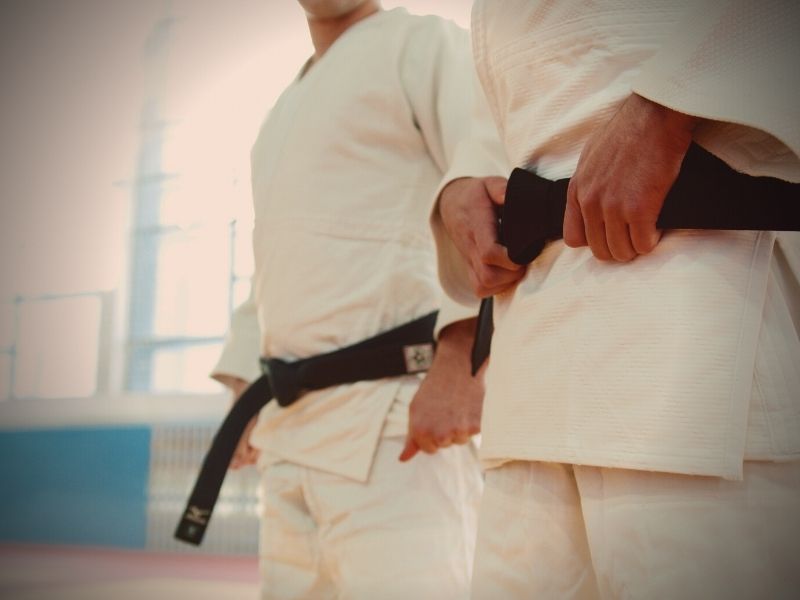
In the current Judo ranking system, students are placed into six descending numerical grades. Beginners start with the sixth kyū (六級, rokkyū) and wear a light blue belt until they attain an elementary level of instruction.
Once they've achieved this, they are promoted to the fifth kyū (五級, gokyū) and begin wearing a white belt. The white belt is worn until the fourth kyū (四級, yonkyū) is achieved.
The remaining three grades (third kyū (三級, sankyū), second kyū (二級, nikyū) and first kyū (一級, ikkyū) are all indicated with brown belts (for seniors) or purple belts (for juniors).
The first kyū (一級, ikkyū) is the final kyū rank before promotion to the first-degree black belt (shodan). The dan ranks, in practice, comprise of 10 levels, which are ranked in ascending numerical order.
The Importance of A Good Judo Instructor

As with any martial art, it's crucial for you to choose the right Judo teacher when you first start learning. A good teacher will have a deep understanding of the techniques and principles of Judo and be able to communicate this knowledge to their students effectively.
They will also be able to adapt their teaching style to suit the individual needs of each student. In addition, a good teacher will be patient and supportive, and they will create a positive and encouraging learning environment.
We really can't overstate this. Choosing the right teacher is just that important for getting the most out of your Judo training, so take your time and do your research before making a decision.
Judo Movies And Figures
A few really good movies with Judo in them are:
- John Wick 1
- John Wick 2
- Man Of Steel
- My Annoying Brother
And just in case you wanted to do some more research, here are some notable figures who practice or have practiced Judo:
- Jigorō Kanō (Founder)
- Charlie Palmer (first non-Japanese to be the President of the IJF)
- Keiko Fukuda (Highest ranked female judoka)
- Vladimir Putin (Awarded 8th dan in 2012 - first Russian to have been awarded this high.)
The Wrap-Up

So! That's about all we've got for Judo. As you've just read, this incredible martial art has tons to offer you.
It's got a rich history waiting for you to discover it and diverse techniques waiting for you to learn them. That's all on top of its excellent psychological benefits, excellent sense of community, opportunity to acquire self-defense skills, and offer for overall improved physical fitness.
So if you're interested in exploring this ancient martial art, I'd highly encourage you to take the first step today. Start your journey towards becoming a Judo practitioner!
You'll need tons of dedication and practice, definitely, but you might find that this amazing martial art can help you achieve more than you ever thought possible.
[author-box-jpx-fitness]
